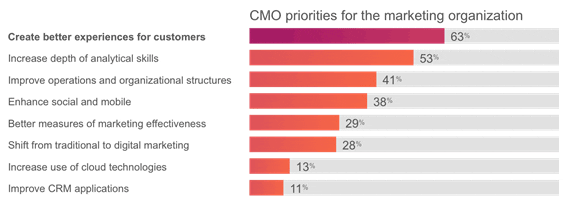 CMOs the world over believe they are at a turning point. Traditional barriers between industries are blurring or even collapsing, as innovative new business models supported by disruptive technologies spring up overnight to challenge the status quo. Internet giants, startups, and companies in adjacent industries that suddenly decide to redirect their core competencies and strategic capabilities towards others – all are creating new hybrids and overturning conventional rules of business in the process. This relatively recent phenomenon, CMOs say, is the single biggest trend transforming the business landscape today.
CMOs the world over believe they are at a turning point. Traditional barriers between industries are blurring or even collapsing, as innovative new business models supported by disruptive technologies spring up overnight to challenge the status quo. Internet giants, startups, and companies in adjacent industries that suddenly decide to redirect their core competencies and strategic capabilities towards others – all are creating new hybrids and overturning conventional rules of business in the process. This relatively recent phenomenon, CMOs say, is the single biggest trend transforming the business landscape today.
As part of the IBM Institute for Business Value’s second Global C-suite Study, we interviewed more than 700 chief marketing officers (CMOs) from around the world. In the process, we uncovered what the CMOs of the most successful enterprises – Torchbearer CMOs, as we call them – are doing to help their organisations navigate their way through the murky waters ahead.
In response to the increasing threat of disruption by digital invaders, two-thirds of the CMOs interviewed said that developing deeper, richer customer experiences across all channels and touch points would be their top priority in coming years (see Figure 1). This focus on customer experience clearly trumped other counter-measures such as improving CRM applications, which only 11% said was their main concern.

Figure 1: CMOs regard developing better customer experiences as their top marketing priority
So what does this idea of creating a total, immersive, integrated experience actually look like, in practice? For one thing, CMOs are finally leaving behind the notion of segmentation. The future of marketing involves moving to individualised engagement – the “segment of one” model described by Don Peppers and Martha Rogers in their groundbreaking 1993 book The One to One Future.
They also expect to engage customers through digital channels to a far greater extent than ever before. Four out of five CMOs anticipate more digital, virtual interaction with customers, an 11% increase since the last time we asked the question two years ago (see Figure 2). The converse is also true: the percentage of CMOs who expect to see more face-to-face interaction taking place within their business has dropped to as low as 6% – a 63% decrease over the same period.

Figure 2: CMOs are continuing their move toward more digital engagement
Whilst such a drastic shift can be attributed to the rise of social and mobile, in turn supported by the millennial generation and other digital natives, we need to sound a note of caution here. CMOs can’t forego the physical opportunities to engage customers and enhance the relationship, certainly not completely. In fact, ‘torchbearer’ CMOs are taking a more holistic, multi-faceted approach to customer experience and engagement. Rather than exclusively focusing on the digital end of the spectrum, torchbearer CMOs are also enthusiastic about developing better in-person experiences.
Background
In 2015, IBM surveyed 5,247 business leaders in more than 70 countries for its latest C-suite Study, the 18th IBM study to focus on the C-suite. Redefining Markets: The CMO Perspective, focuses on the responses of the 723 CMOs who participated in the research.
The full report – Redefining Markets: The CMO Perspective on the Global C-suite Study – delves further into how the world’s marketing leaders are responding to the threats (and opportunities) presented by these seismic shifts in the business landscape. Download your copy here.
Written by Stephen Marshall, C-suite study program manager (Asia-Pacific) at the IBM Institute for Business Value
If you enjoyed this article, you can subscribe for free to our weekly event and subscriber alerts.
We have four email alerts in total - covering ESG, PR news, events and awards. Enter your email address below to find out more:



